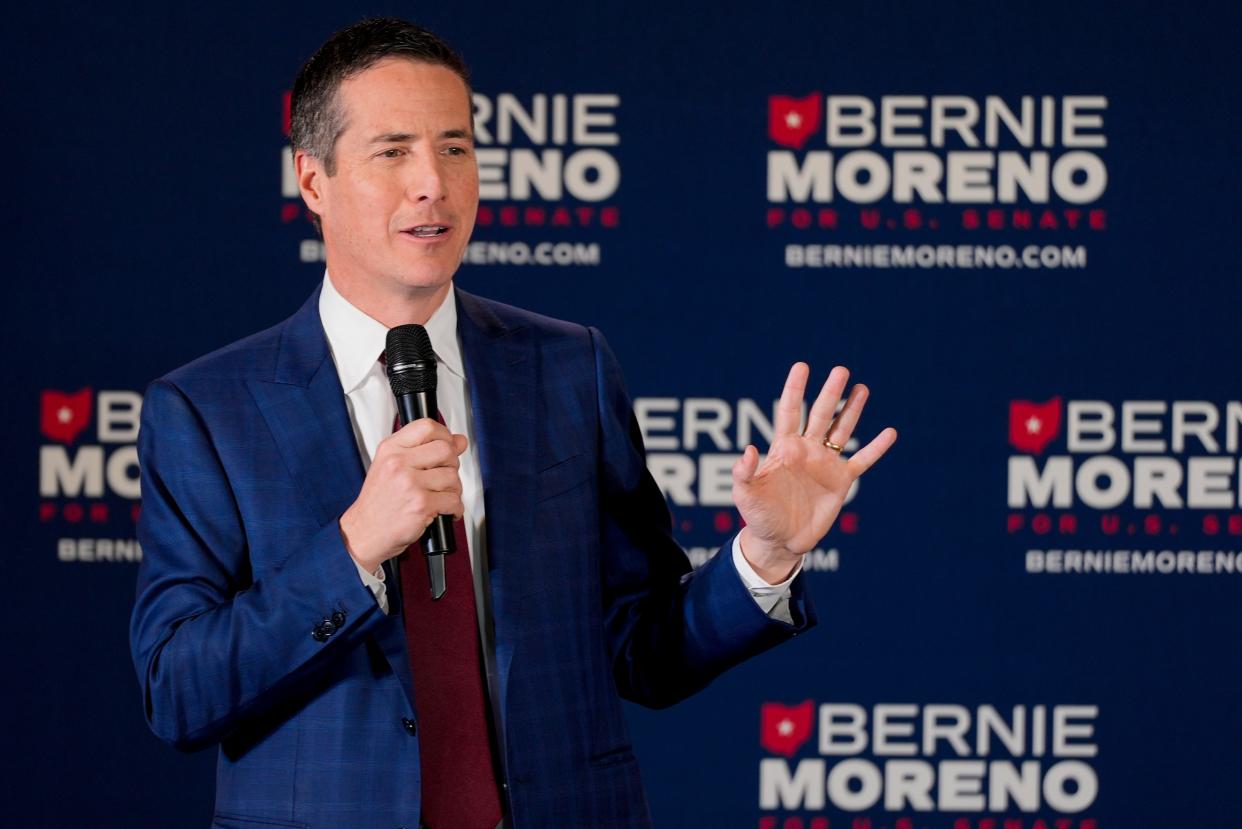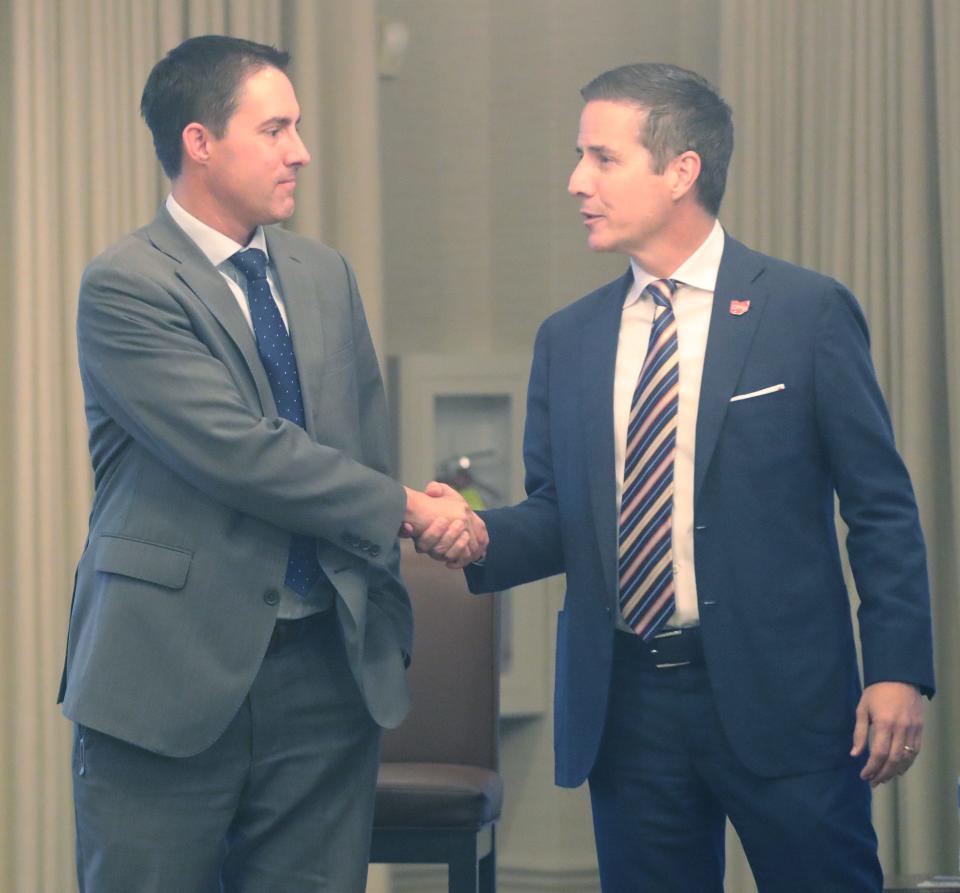How Senate candidate Bernie Moreno got caught in court fight over employees' overtime pay

- Oops!Something went wrong.Please try again later.
A Republican running in Ohio's U.S. Senate race was sued over a dozen times as the owner of a Massachusetts car dealership amid a broader fight over how businesses paid overtime to commissioned employees in the state.
The suits against businessman Bernie Moreno said he failed to properly pay salespeople overtime when he managed a Mercedes-Benz dealership in Burlington − about 13 miles northwest of Boston − although he used a standard pay practice for the industry.
A jury ordered Moreno to pay two employees more than $400,000 in one case, and 14 other cases were settled for an undisclosed amount by January 2023 − just months before Moreno launched his second Senate bid.
Moreno is running against Secretary of State Frank LaRose and state Sen. Matt Dolan, R-Chagrin Falls, in the GOP primary for the chance to take on Democratic U.S. Sen. Sherrod Brown in November. The primary is March 19.
Moreno first entered the car industry in 2005, when he purchased a struggling Mercedes-Benz dealership in the Cleveland suburb of North Olmsted. He expanded that dealership into a multi-state franchise before pivoting to the world of blockchain technology.
Then came a series of court cases that would shake up Moreno's Burlington dealership. A former salesman sued Moreno and the company in 2017, saying he and other sales employees didn't get overtime when they worked more than 40 hours per week. The dealership allocated overtime wages to employees' base pay when calculating how much to give them based on commission.
That formula for handling overtime was typical for dealerships and allowed under federal law, as long as employees earned a certain amount. But in 2019, the Massachusetts Supreme Judicial Court determined the practice violated state law − which triggered 16 more lawsuits against Moreno and left employers across the state on the hook.
The USA TODAY Network Ohio Bureau reviewed court documents from Moreno's lawsuits and the Supreme Judicial Court case.
"I know what it really takes to help working-class Americans because those are the people that worked for me," Moreno said in an interview. "That overtime situation was very, very well-compensated salespeople. My technicians, my hourly workers, my receptionist, all those people got paid every single cent of overtime."
Moreno dealership faced first lawsuit in 2017
The Burlington dealership faced its first lawsuit just months before the Supreme Judicial Court took up a similar case involving a mattress store called Sleepy's. In the 2017 complaint, Omar Adem said he and his colleagues routinely worked more than 40 hours a week and did not receive separate overtime checks paid at time-and-a-half.
Attorneys who represented Adem and other former employees who sued Moreno did not respond to interview requests.
Moreno disputed the allegations from the beginning. His attorneys said Adem failed to provide evidence that he worked overtime and instead was habitually late or absent. Moreno told the court that the dealership encouraged 40-hour work weeks and instructed hourly employees and salespeople to log their hours.
The dealership was closed on Sundays, according to Moreno. One employee who testified on his behalf said it had "country club" working hours compared to others in the area.
The lawsuit involving Adem − and eventually a second employee − played out for years. In the final months of the case, Moreno got in trouble with the court for destroying documents that flagged who worked overtime at the dealership.
The monthly reports were based on data managed by a third-party payroll vendor. Moreno's attorneys argued they weren't pertinent because sales employees didn't work overtime and thus weren't listed. During a 2021 hearing, Moreno said unnecessary records were shredded in 2020 after he sold the Burlington dealership.
"If you've ever been somebody who's moved from one house to another, I mean, you know how that goes. Your record collection all of a sudden is missing Billy Joel," Moreno said, according to a transcript of the hearing.
Justice Michael Ricciuti didn't buy it and sanctioned Moreno. He argued Moreno should have known the reports would be relevant and said his attorneys couldn't prove the data was preserved electronically. Ricciuti also said the plaintiffs shouldn't be "forced to take Moreno's word" about whether salespeople were listed.

'This took everybody down'
As the Adem case unfolded, the Supreme Judicial Court made a pivotal decision in the Sleepy's case that trickled down to Moreno. In the 2019 ruling, the court said commissioned employees are entitled to separate payments for overtime and Sunday hours beyond their draws and commissions.
"Certainly, many employers were violating the law," said Ryan Quinn, a law professor at Northeastern University in Boston. "I don’t know that any individual employer was acting as a scofflaw or anything by paying people this way, because in many ways, this was a significant change in the understanding of state wage law."
Fast forward to 2021: Former sales employees began filing lawsuits similar to Adem's. Most of them began around spring 2021, when Moreno launched his bid for Ohio's 2022 Senate race. He dropped out after meeting with former President Donald Trump, who endorsed him in the 2024 contest.
Then, in November 2022, a jury determined that Adem and the second employee proved they were owed overtime − and that the dealership should have known they worked more than 40 hours. Moreno had to pay roughly $416,000 to the employees for overtime, damages and attorneys' fees.
Another 14 cases were settled two months later, shortly before Moreno kicked off his 2024 campaign. One employee withdrew his lawsuit weeks after filing it, and a judge dismissed another case after the plaintiff failed to appear for a court hearing.
"This took everybody down," Moreno said. "But I just thought it was wrong. If I had owed people $1, I would've pay them. But these are salespeople that are making $10,000 a week. And they're saying, 'Yeah, but I worked four hours of overtime. It's four times $5, so you owe me 20 bucks.' What?"
Haley BeMiller is a reporter for the USA TODAY Network Ohio Bureau, which serves the Columbus Dispatch, Cincinnati Enquirer, Akron Beacon Journal and 18 other affiliated news organizations across Ohio.
Get more political analysis by listening to the Ohio Politics Explained podcast
This article originally appeared on The Columbus Dispatch: How Bernie Moreno got caught in fight over employees' overtime pay

